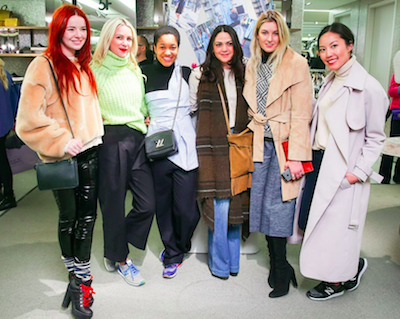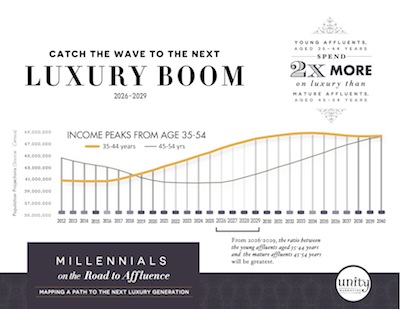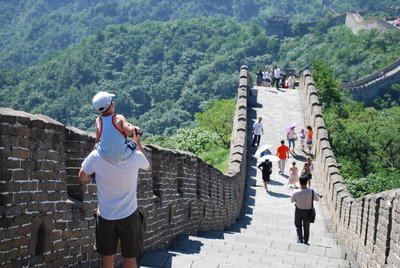 Affluent millennials
Affluent millennials
As baby boomers age and millennials mature into established consumers, luxury brands will have to retool many of their marketing strategies to account for the generational shift, according to a new report by Unity Marketing.
“Millennials on Road to Affluence: Mapping a Path to the Next Luxury Generation” says that in approximately 10 years, the next consumer spending boom is scheduled due to the influx of millennial consumers who have traveled on the road to affluence. The consumers, who will be between the ages of 34-54 years old in 2015 to 2034, will replace baby boomers as the prime target for marketers working at both the high-end and low-end of the market.
"Brands will need to bring fresh eyes and a fresh perspective to the millennial generation," said Pam Danziger, president of Unity Marketing, Stephens, PA. "They will need to understand that millennials are going to be as different from their parent’s generation (who are the baby boomers) as the baby boomers were from their World War II/Swing generation parents.
"Nothing should be taken for granted," she said. "Millennials will define luxury in a brand new style and express luxury in brand new ways."
"I think way too much emphasis in the luxury industry is placed on aspiration, and building that aspiration for their brands as status symbols and expressions of the ‘good life,’ whatever that may be. They need instead to focus on inspiration, rather than aspiration – that is inspiring their customers to desire their brands as the best-of-the-best and quality that will last and be a true classic."
New aged consumers
With the new generational consumer shift, marketers will need to adapt to the changing times and behavior, tastes, perception of luxury and attitudes of this group of individuals.
The Affluent Millennials sect is described by Unity Marketing as individuals at the top 20 percent of incomes within the United States consumer market.
As the top quintile, this demographic accounting for only 20 percent of the U.S. population is responsible for almost half of all consumer spending at 40 percent. Across all market sectors, this group is considered “heavy-lifters” in the economy.
Due to their affluent income, millennials are able to jump around the consumer market, preferring to shop from a mixture of high-end, low-end and price points in between. Thus, their spending power is immense and they will have the ability to truly dictate which brands make the cut and which will falter as they struggle to maintain relevance amongst this demographic.
 Millennial-aged bloggers
Unity Marketing suggests that in 2015, many millennials will start to reach peak earning years, but it will be another decade or so before their numbers reach high enough to spur a consumer economic boom.
Millennials on Road to Affluence: Mapping a Path to the Next Luxury Generation acts as a road map for marketers working toward closing the gap between today’s core consumers and tomorrow’s affluent millennials. Unity Marketing’s pointers will help marketers to better understanding the behavior and sentiment of affluent millennials overall through insights to lifestyle and potential.
Points on Unity Marketing’s map include a look at how the economic status of parents of millennials will impact their children's purchasing power and spending potential.
Financial researcher Wealth-X has found that 75 percent of the ultra-high net worth population is over the age of 50, and over the next three decades, $16 trillion is expected to be passed down to younger generations. When wealth moves to new generations, the inheritors tend to do active things with the money (see story).
"Millennials are not going to want their parent’s or their grandparent’s luxury," Ms. Danziger said. "They will want luxury on their own terms and delivered in their own ways.
"Brands that want to continue their success in the luxury market beyond 2020 will require products, services, and strategies that match the aspirations and drive for meaning that this generation reflects," she said. "The years from 2026-2029 have the potential for a new luxury boom, like we saw during the 80s and 90s as the boomers gained affluence.
"But that boom could easily go bust is brands are doing their due diligence to understand this new customer, what they want and what they expect from luxury and high end brands," she said.
Millennial-aged bloggers
Unity Marketing suggests that in 2015, many millennials will start to reach peak earning years, but it will be another decade or so before their numbers reach high enough to spur a consumer economic boom.
Millennials on Road to Affluence: Mapping a Path to the Next Luxury Generation acts as a road map for marketers working toward closing the gap between today’s core consumers and tomorrow’s affluent millennials. Unity Marketing’s pointers will help marketers to better understanding the behavior and sentiment of affluent millennials overall through insights to lifestyle and potential.
Points on Unity Marketing’s map include a look at how the economic status of parents of millennials will impact their children's purchasing power and spending potential.
Financial researcher Wealth-X has found that 75 percent of the ultra-high net worth population is over the age of 50, and over the next three decades, $16 trillion is expected to be passed down to younger generations. When wealth moves to new generations, the inheritors tend to do active things with the money (see story).
"Millennials are not going to want their parent’s or their grandparent’s luxury," Ms. Danziger said. "They will want luxury on their own terms and delivered in their own ways.
"Brands that want to continue their success in the luxury market beyond 2020 will require products, services, and strategies that match the aspirations and drive for meaning that this generation reflects," she said. "The years from 2026-2029 have the potential for a new luxury boom, like we saw during the 80s and 90s as the boomers gained affluence.
"But that boom could easily go bust is brands are doing their due diligence to understand this new customer, what they want and what they expect from luxury and high end brands," she said.
 Unity Marketing infographic
The report also examines the lifestyle aspirations of millennials such as aspirations for marriage, children and family and goals such as financial security, happiness and success in their chosen career.
To best cater to these aspirations, which are held to very high regard by millennials, marketers must be able to position their brands around consumers’ sentiment and goals. It does not entail just positioning around consumers’ aspirations but rather what it will mean in terms of their happiness, satisfaction, contentment and how brands align with those feelings and experiences.
"The fact is our research found Millennials on the road to affluence had very traditional aspirations, including marriage and family with dog or cat, more middle-class than luxury class home, and more middle-class than luxury-class cars," Ms. Danziger said. "What they did aspire to was a lifestyle that gave them time to express their personal passions.
"To achieve that personal time (or freedom, as some expressed it), they seemed more than willing to trade off 50-60 hour work weeks and heavy mortgages and expensive car payments for a more modest lifestyle day-to-day as long as they got their reward, which means time to goof off and play with family and friends time to goof off and play with family and friends and plenty of vacations," she said.
Travel and hospitality brands have been successful thus far in this aspect. Hotels have worked to incorporate experiential travel with family-friendly touch points to go beyond a purchase but to play to consumers’ hearts and minds.
Unity Marketing infographic
The report also examines the lifestyle aspirations of millennials such as aspirations for marriage, children and family and goals such as financial security, happiness and success in their chosen career.
To best cater to these aspirations, which are held to very high regard by millennials, marketers must be able to position their brands around consumers’ sentiment and goals. It does not entail just positioning around consumers’ aspirations but rather what it will mean in terms of their happiness, satisfaction, contentment and how brands align with those feelings and experiences.
"The fact is our research found Millennials on the road to affluence had very traditional aspirations, including marriage and family with dog or cat, more middle-class than luxury class home, and more middle-class than luxury-class cars," Ms. Danziger said. "What they did aspire to was a lifestyle that gave them time to express their personal passions.
"To achieve that personal time (or freedom, as some expressed it), they seemed more than willing to trade off 50-60 hour work weeks and heavy mortgages and expensive car payments for a more modest lifestyle day-to-day as long as they got their reward, which means time to goof off and play with family and friends time to goof off and play with family and friends and plenty of vacations," she said.
Travel and hospitality brands have been successful thus far in this aspect. Hotels have worked to incorporate experiential travel with family-friendly touch points to go beyond a purchase but to play to consumers’ hearts and minds.
 Abercrombie & Kent China trip for families
For example, luxury travel company Abercrombie & Kent is reimagining its Family Journeys trips to refocus on the importance of family travel. Families will now be able to travel to seven continents with 10 new itineraries (see story).
Additional insights provided by the report include how millennials view emerging consumer business models such as the new sharing economy and its role in their daily lives. With 51 percent of the world’s population active on social media (see story), a successful strategy can influence the purchasing and shopping decisions of millennial consumers.
Changing thoughts
Marketers must have a good understanding of what luxury means to the affluent millennial. Even now, opinions on what constitutes true luxury has already begun to shift.
The luxury sector is continuing to evolve with the majority of affluent consumers recognizing that the definition of luxury is not what it was five years ago, according to a report by Martini Media.
As consumers’ tastes have changed from exclusive or status-oriented products to an interest in rare experiences, the Internet has been a driving factor in how these individuals make decisions regarding purchases and bookings. Marketers have invested heavily in digital marketing to account for this trend and to provide consumers with content geared toward ensuring informative purchases (see story).
Affluent millennials attitudes toward luxury reflects they ways in which many live their lives.
In our research when we asked the millennials with high-earning potential and ambitious career goals to draw their picture of the ‘American Dream’ how modest their suburban homes were pictured (i.e. Cape Cod-style house with white picket fence), but so often they had another house in that picture, their vacation home," Ms. Danziger said.
"[Millennials] seemed to recognize you can’t have it all and you have to make trade offs, so they will live in a more modest track home weekdays, but live it up on the weekends at their country place," she said. "That is their luxury, and I should mention their American Dream ‘country place’ wasn’t some chateau, but a little cabin in the woods, by the lake or the shore."
Final Take
Jen King, lead reporter on Luxury Daily, New York
Abercrombie & Kent China trip for families
For example, luxury travel company Abercrombie & Kent is reimagining its Family Journeys trips to refocus on the importance of family travel. Families will now be able to travel to seven continents with 10 new itineraries (see story).
Additional insights provided by the report include how millennials view emerging consumer business models such as the new sharing economy and its role in their daily lives. With 51 percent of the world’s population active on social media (see story), a successful strategy can influence the purchasing and shopping decisions of millennial consumers.
Changing thoughts
Marketers must have a good understanding of what luxury means to the affluent millennial. Even now, opinions on what constitutes true luxury has already begun to shift.
The luxury sector is continuing to evolve with the majority of affluent consumers recognizing that the definition of luxury is not what it was five years ago, according to a report by Martini Media.
As consumers’ tastes have changed from exclusive or status-oriented products to an interest in rare experiences, the Internet has been a driving factor in how these individuals make decisions regarding purchases and bookings. Marketers have invested heavily in digital marketing to account for this trend and to provide consumers with content geared toward ensuring informative purchases (see story).
Affluent millennials attitudes toward luxury reflects they ways in which many live their lives.
In our research when we asked the millennials with high-earning potential and ambitious career goals to draw their picture of the ‘American Dream’ how modest their suburban homes were pictured (i.e. Cape Cod-style house with white picket fence), but so often they had another house in that picture, their vacation home," Ms. Danziger said.
"[Millennials] seemed to recognize you can’t have it all and you have to make trade offs, so they will live in a more modest track home weekdays, but live it up on the weekends at their country place," she said. "That is their luxury, and I should mention their American Dream ‘country place’ wasn’t some chateau, but a little cabin in the woods, by the lake or the shore."
Final Take
Jen King, lead reporter on Luxury Daily, New York
